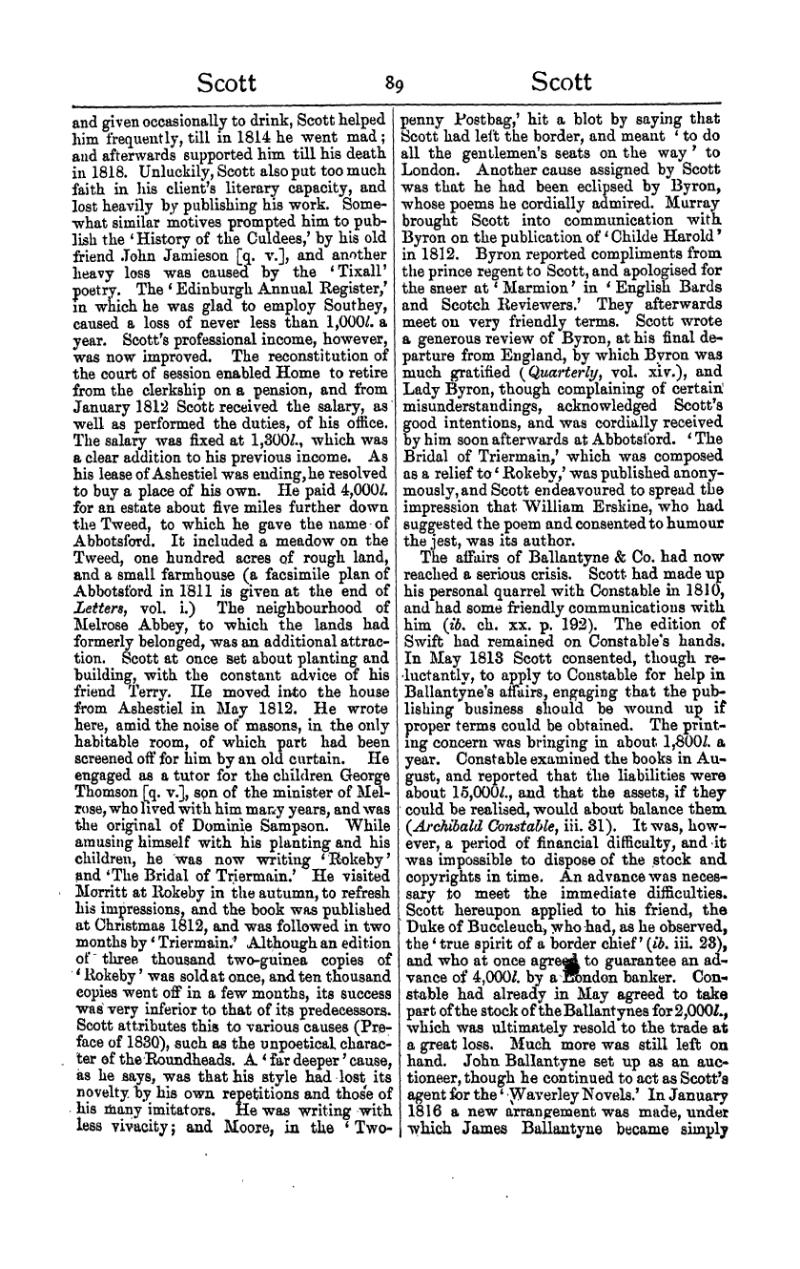and given occasionally to drink, Scott helped him frequently, till in 1814 he went mad; and afterwards supported him till his death in 1818. Unluckily, Scott also put too much faith in his client's literary capacity, and lost heavily by publishing his work. Somewhat similar motives prompted him to publish the ‘History of the Culdees,’ by his old friend John Jamieson [q. v.], and another heavy loss was caused by the ‘Tixall’ poetry. The ‘Edinburgh Annual Register,’ in which he was glad to employ Southey, caused a loss of never less than 1,000l. a year. Scott's professional income, however, was now improved. The reconstitution of the court of session enabled Home to retire from the clerkship on a pension, and from January 1812 Scott received the salary, as well as performed the duties, of his office. The salary was fixed at 1,300l., which was a clear addition to his previous income. As his lease of Ashestiel was ending, he resolved to buy a place of his own. He paid 4,000l. for an estate about five miles further down the Tweed, to which he gave the name of Abbotsford. It included a meadow on the Tweed, one hundred acres of rough land, and a small farmhouse (a facsimile plan of Abbotsford in 1811 is given at the end of Letters, vol. i.) The neighbourhood of Melrose Abbey, to which the lands had formerly belonged, was an additional attraction. Scott at once set about planting and building, with the constant advice of his friend Terry. He moved into the house from Ashestiel in May 1812. He wrote here, amid the noise of masons, in the only habitable room, of which part had been screened off for him by an old curtain. He engaged as a tutor for the children George Thomson [q. v.], son of the minister of Melrose, who lived with him many years, and was the original of Dominie Sampson. While amusing himself with his planting and his children, he was now writing ‘Rokeby’ and ‘The Bridal of Triermain.’ He visited Morritt at Rokeby in the autumn, to refresh his impressions, and the book was published at Christmas 1812, and was followed in two months by ‘Triermain.’ Although an edition of three thousand two-guinea copies of ‘Rokeby’ was sold at once, and ten thousand copies went off in a few months, its success was very inferior to that of its predecessors. Scott attributes this to various causes (Preface of 1830), such as the unpoetical character of the Roundheads. A ‘far deeper’ cause, as he says, was that his style had lost its novelty by his own repetitions and those of his many imitators. He was writing with less vivacity; and Moore, in the ‘Two-penny Postbag,’ hit a blot by saying that Scott had left the border, and meant ‘to do all the gentlemen's seats on the way’ to London. Another cause assigned by Scott was that he had been eclipsed by Byron, whose poems he cordially admired. Murray brought Scott into communication with Byron on the publication of ‘Childe Harold’ in 1812. Byron reported compliments from the prince regent to Scott, and apologised for the sneer at ‘Marmion’ in ‘English Bards and Scotch Reviewers.’ They afterwards met on very friendly terms. Scott wrote a generous review of Byron, at his final departure from England, by which Byron was much gratified (Quarterly, vol. xiv.), and Lady Byron, though complaining of certain misunderstandings, acknowledged Scott's good intentions, and was cordially received by him soon afterwards at Abbotsford. ‘The Bridal of Triermain,’ which was composed as a relief to ‘Rokeby,’ was published anonymously, and Scott endeavoured to spread the impression that William Erskine, who had suggested the poem and consented to humour the jest, was its author.
The affairs of Ballantyne & Co. had now reached a serious crisis. Scott had made up his personal quarrel with Constable in 1810, and had some friendly communications with him (ib. ch. xx. p. 192). The edition of Swift had remained on Constable's hands. In May 1813 Scott consented, though reluctantly, to apply to Constable for help in Ballantyne's affairs, engaging that the publishing business should be wound up if proper terms could be obtained. The printing concern was bringing in about 1,800l. a year. Constable examined the books in August, and reported that the liabilities were about 15,000l., and that the assets, if they could be realised, would about balance them (Archibald Constable, iii. 31). It was, however, a period of financial difficulty, and it was impossible to dispose of the stock and copyrights in time. An advance was necessary to meet the immediate difficulties. Scott hereupon applied to his friend, the Duke of Buccleuch, who had, as he observed, the ‘true spirit of a border chief’ (ib. iii. 23), and who at once agreed to guarantee an advance of 4,000l. by a London banker. Constable had already in May agreed to take part of the stock of the Ballantynes for 2,000l., which was ultimately resold to the trade at a great loss. Much more was still left on hand. John Ballantyne set up as an auctioneer, though he continued to act as Scott's agent for the ‘Waverley Novels.’ In January 1816 a new arrangement was made, under which James Ballantyne became simply
